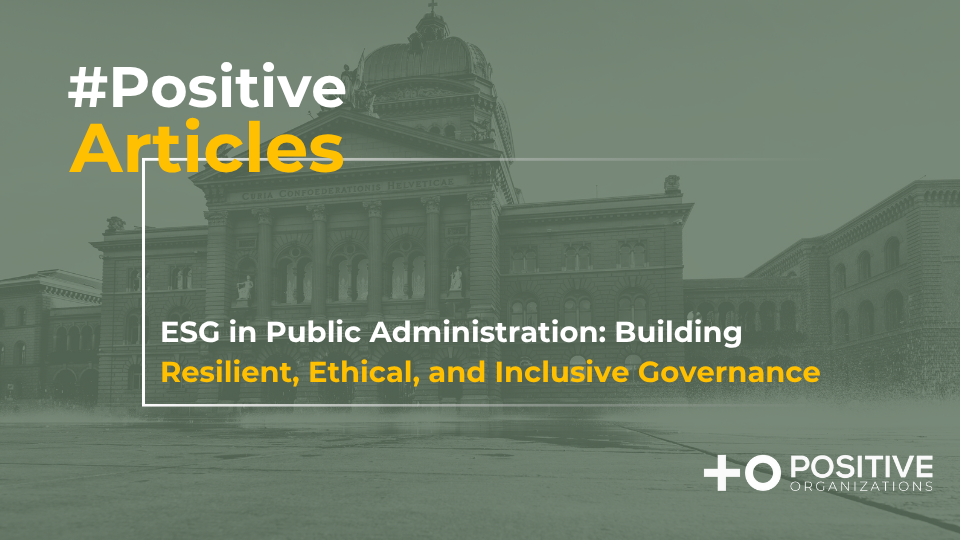.png)

Public administration lies at the heart of democratic societies—delivering essential services, shaping public policies, and managing collective resources. As global challenges intensify—from climate change to inequality, digital disruption, and public health—government institutions are under growing pressure to integrate Environmental, Social, and Governance (ESG) principles not as a luxury, but as a necessity for long-term societal resilience and trust.
For public bodies at all levels—local, regional, and national—ESG is no longer optional. It is a strategic imperative. Institutions that lead on ESG build public confidence, strengthen accountability, and enhance their ability to deliver in the face of systemic risk. They also play a pivotal role in unlocking capital flows, shaping equitable markets, and creating the enabling infrastructure for private sector decarbonization.
Why ESG in the Public Sector Matters More ThanEver
The public sector influences nearly every facet of society—urban planning, mobility, education, health, and economic development. As such, it is uniquely positioned to act on multiple ESG fronts:
- Environmental: from reducing emissions in government buildings to investing in climate-resilient infrastructure and sustainable mobility.
- Social: by embedding equity, inclusion, and well-being in public services and workforce practices.
- Governance: through transparency, ethical procurement, risk oversight, and citizen engagement.
At the same time, regulatory frameworks such as the EU’s CSRD and national climate strategies are increasing pressure for public entities to track emissions, demonstrate inclusive impact, and align procurement with ESG objectives. And citizen expectations are evolving: peoplewant public institutions that are efficient—but also fair, transparent, and future-ready.
From Commitment to Action: How to Operationalize ESG in Public Administration
Implementing ESG requires a holistic and systemic approach that reflects the public sector’s mandate and complexity. This starts with a mission-aligned strategy, but must also include:
- Clear, measurable targets, aligned with international frameworks like GRI, TCFD, ESRS, and SDGs.
- Cross-departmental coordination, to ensure ESG principles permeate energy planning, budgeting, HR, procurement, and service delivery.
- Stakeholder engagement, including civil society, employees, elected officials, and communities—because democratic legitimacy is foundational to lasting impact.
- Transparent metrics and data infrastructure, enabling emissions tracking, performance benchmarking, and credible reporting.
As noted by the Net-Zero Industry Tracker 2024, sectors cannot reach their decarbonization targets in isolation. Governments must lead collaborative ecosystems, enabling private and public actors to scale innovation, infrastructure, and finance. In fact, 57% of the investments needed for net-zero must come from outside the sectors themselves—meaning public capital and governance are essential levers for change. The Benefits: Resilience, Trust, and Operational Excellence
Public institutions that integrate ESG don’t just meet compliance—they create long-term public value:
- They are more resilient to environmental, economic, and social shocks.
- They enhance citizen trust by aligning operations with community values.
- They drive efficiency and innovation through better resource use, risk management, and digital transformation.
- They attract and retain purpose-driven talent, especially among younger generations seeking careers with social impact.
Moreover, ESG-aligned administrations are better positioned to catalyze systemic change—setting standards in sustainable procurement, incentivizing low-carbon technologies, and guiding society througha just transition.
How We Support Public Sector Transformation
At Positive Organizations, we work with public institutions to translate ESG ambition into practical, measurable results. Whether you are a municipality, ministry, agency, or public enterprise, we tailor our services to your mission and stakeholder landscape.
We support:
- Environmental transformation: through energy audits, low-carbon infrastructure planning, climate adaptation strategies, and green public procurement.
- Social inclusion: by designing and implementing DEI frameworks, equitable service models, and staff well-being programs.
- Governance excellence: by building ethical standards, risk and compliance systems, and transparent reporting aligned with global frameworks and local mandates.
- Data and reporting capacity: with robust ESG reporting strategies, integrated digital tools, and citizen-focused communication.
- Ecosystem innovation: through public-private labs, training programs, and collaboration platforms that foster a culture of leadership, continuous learning, and system change.
Ready to Lead the Transition?
Good governance today must be sustainable, inclusive, and transparent. ESG is not an administrative exercise—it is a strategic lever for legitimacy, efficiency, and impact. At Positive Organizations, we help public sector leaders act with clarity, purpose, and courage.
Because doing right by people and the planet isn’t just a political choice—it’s essential to the future of governance itself.
.png)
Net Zero for the Shipping Industry Is Possible. But Only If We Act Now.


ESG in Public Administration: Building Resilient, Ethical, and Inclusive Governance


ESG in the Healthcare Industry: Building Resilient and Responsible Health Systems

Inizia il tuo
viaggio oggi











